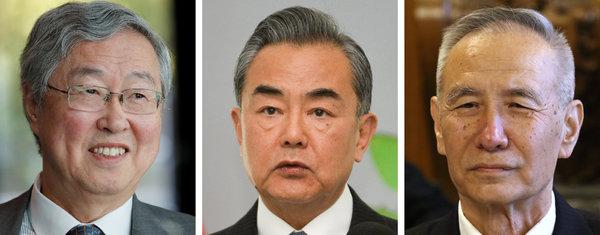HONG KONG — President Xi Jinping is known for breaking the rules of Chinese politics, amassing more power than any leader since Mao.
His latest attempt to shake things up may be one of his boldest moves yet: Mr. Xi is going slightly — though unabashedly — gray, in defiance of longstanding Communist Party tradition.
For decades, Chinese leaders have sported unnaturally black heads of hair, a look that symbolized unity and gave the party a youthful veneer.
But Mr. Xi, 65, appears to be dispensing with vanity as he presents himself as a relatable and avuncular leader, part of his efforts to soften his hard-line policies.
As Mr. Xi takes part in the annual meeting of China’s legislature this week, the silver streaks in his hair have been a hit with delegates and the public.
“He’s very humble,” said Gu Yan, 47, an employee at a technology firm in the eastern city of Xiamen. “He’s not afraid to be himself.”
Mr. Xi has a history of making sartorial choices that underscore his image as a man of the people. He is often pictured in China wearing a navy blue, zippered windbreaker, a symbol of humility as he leads a campaign against corruption.
His salt-and-pepper hair further reinforces that image, as well as Mr. Xi’s desire to be seen as a paternal figure and live up to the nickname by which he is popularly known, “Uncle Xi,” experts say.
“It’s not this image of the stodgy cadre who must be exactly dyed and dressed in the right mold,” said Julian Gewirtz, a scholar who studies Chinese history and politics at Harvard. “It’s an image of the party that is more relatable and less apparatchik-like in its aesthetics.”
Going gray was not always such a big deal in China — both Mao and Deng Xiaoping, China’s paramount leader, embraced a silver-haired look in their later years.

From left: Zhou Xiaochuan, former governor of the People’s Bank of China; Foreign Minister Wang Yi; and Vice Premier Liu He.CreditReuters, Agence France-Presse – Getty Images, EPA, via Shutterstock
But more recently, as the party promoted a “collective leadership” model to spread power more evenly after the strongman days of Mao, flawless black hair joined the sickle and hammer as part of the Communist uniform.
In the past, hair color has often been seen as a symbol of status within the party. In 2015, for example, Zhou Yongkang, China’s former chief of domestic security, was shown confessing to crimes during a sentencing hearing, his formerly jet-black hair having turned into a shock of white while he was in detention.
Zhang Jiehai, a sociologist at the Shanghai Academy of Social Sciences, said that in the past Chinese officials had dyed their hair to obscure health conditions and promote a more youthful image. But now, he said, Chinese officials are younger and society has grown more open.
“It has become more natural,” he said. “The leaders no longer need to cover up gray hair.”
How exactly Chinese officials maintain the jet-black look is something of a state secret, though copious amounts of dye are probably involved.
Mr. Xi’s hair was mostly black when he rose to power in 2012. But as he has grappled with a slowing economy, diplomatic tussles in the South China Sea and a trade war with the United States, his hair has turned grayer.
His silver-haired look has not gone unnoticed in the party.
In 2016, a delegate at the National People’s Congress said she had noticed during a meeting with Mr. Xi that he had more gray hair.
“Our country is so big,” the delegate, Zhu Xueqin, speculated at the time. “He needs to manage all sorts of things and it’s very hard.”
Mr. Xi’s example seems to be catching on: At least seven members of the Politburo, an elite 25-member council at the highest levels of the Communist Party, also have gray hair. Prominent officials with gray hair include Liu He, a vice premier, and Wang Yi, the foreign minister.
While gray hair might be seen as undesirable elsewhere in the world (President Trump proudly declared on Saturday, “I have no white hair”), in China some view it as a sign of wisdom.
At barbershops in China, stylists said they applauded Mr. Xi’s decision to go gray.
“It makes him look like he works harder — that he’s laboring day and night,” said Liu Ke, a stylist at a salon in the central city of Xi’an.
Jiang Zhirong, the co-owner of a barbershop in a Beijing alleyway, said Mr. Xi couldn’t go wrong.
“Whether he dyes his hair or not,” she said, “the president has great style.”







